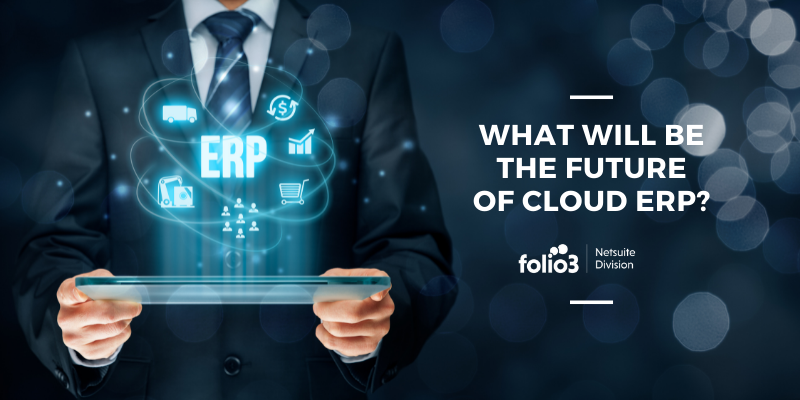What Will Be the Future of Cloud ERP?
The cloud-based Enterprise Resource Management System is a software that provides ease in the management of business operations, increasing efficiency across a wide range of functions such as Finance, Marketing, Procurement, Human Resources, and so forth. The market for cloud ERPs have been steadily growing over the past decade, as the world is becoming increasingly tech-savvy, but the past year has seen an acceleration in the industry as COVID-19 has forced companies to turn to technology like NetSuite to ensure their continuation in these changed circumstances.
What makes cloud ERP such an important tool during the pandemic? The significance of a cloud ERP is how all data and information of a specific business are stored in the cloud, instead of on physical servers. Information can be made accessible anywhere, and to more people, making remote work possible in a way it would not have been if companies were reliant on being at a physical location for access to data. Furthermore, the automation of tasks such as data synchronization and integration, updates, etc. makes for a much more efficient process requiring less human resources to keep things running smoothly. Such advantages would be a great benefit to companies trying to manage their operations during COVID-19. Considering its increasing relevance in today’s world, it only makes sense to keep a track of the future of could ERPs, to see where this technology is headed.
Growth:
One thing that can be assured about the future of cloud ERP is that the industry will continue to grow exponentially. This technology is only becoming more and more sought after, especially with changes in business operations during and post-pandemic. Companies that are currently using on-premise ERPs are also expected to switch to the cloud, to make use of the advantages provided and avoid the hassle of the lack of flexibility. After facing great difficulties during the pandemic due to reliance on either paper or on-premise systems, companies have come to see a necessity in having their data constantly synchronized, backed up, and accessible.
Another aspect of cloud ERPs that contributes to growth in the market is adaptability. Cloud ERPs like NetSuite are customizable to fit the requirements of different companies and their unique business models. Thus, services like NetSuite Integration encourage businesses to invest in cloud management systems with the assurance that they will be equipped with the specific features they require to overcome any challenges they may face. In times like the current pandemic, businesses are likely to turn to such solutions to provide them with a safety net and ensure their survival, which forecasts the industry continuing to see much growth and development in the next few years.
Remote Work:
Cloud ERPs have not only made remote work a possibility for the duration of the pandemic but also for the future. There are several features provided that make it possible to manage large-scale operations from a distance, such as the accessibility of data from different locations and platforms and visibility across all channels. This enables business managers to keep a track of not only various business processes without a physical presence but also of employee performance. Cloud ERPs also offer an increase in efficiency valued by companies today through the automation of processes such as data synchronization, not only ensuring that such tasks are completed as quickly as possible but also that resources are not wasted on them. The employees previously responsible for manually completing tasks like data transferring no longer need to do so, and thus their time and efforts can better be utilized for different aspects of the business.
Through the use of cloud ERPs, companies also have the means to much more effective methods of communication. People having access to the same information virtually, combined with better communication systems than ever before, has made it possible to uphold the system of remote work post-pandemic as well. Businesses are unlikely to return completely to the previous model of functioning, realizing how both time and resources can be saved and better utilized. Human Resource departments can also more easily manage their functions online, creating easier systems for employees to take advantage of to fulfill their logistical requirements while at the same time being able to work on aspects like satisfaction and a positive working environment through the benefits provided by Cloud ERPs. All these advantages provided to companies by cloud ERPs mean a likely continuation of remote work, in turn ensuring a continued and increasing dependence on this system which will contribute to its growth and evolution in the future.
Artificial Intelligence and Machine Learning:
Developments like artificial intelligence and machine learning have, in this day and age, perhaps become the most sought out form of technology for the business world. All organizations have come to depend on intelligent technology for strategy and automatic decision-making processes based on analysis of data collected during various business processes. Cloud ERPs are already using this technology to a certain extent. Artificial intelligence is currently being used in cloud ERPs to predict user behavior and react accordingly, providing ease in the use of the technology. It both saves time and creates efficiency, decreasing the need for input from the employees using the system. However, there is scope for much more.
Researchers are continuously working on how to integrate these new technologies with cloud ERPs, so the system can continue to evolve and the users can take advantage of additional features. This will take cloud ERPs to the next step, where not only will they provide the users with all the information to make informed business decisions but will also be able to make recommendations themselves based on an in-depth analysis of data. With the flexibility to continuously evolve to incorporate new technology, cloud ERPs have great potential to continue to be relevant for the foreseeable future.
Conclusion:
In conclusion, the use of cloud ERPs is expected to grow exponentially in the future. Such predictions come not only from their ability to cope with and adapt to the changing circumstances and new challenges brought about by recent times, but also provide a sustainable system that can be utilized for years to come in a post-pandemic world. Furthermore, the ability to constantly evolve according to technological innovations prevents them from becoming obsolete in the near future. Thus, the market of cloud ERPs can be expected to thrive as businesses continue to recognize the advantages of adaptability and flexibility, ensuring a bright future for the management system.













